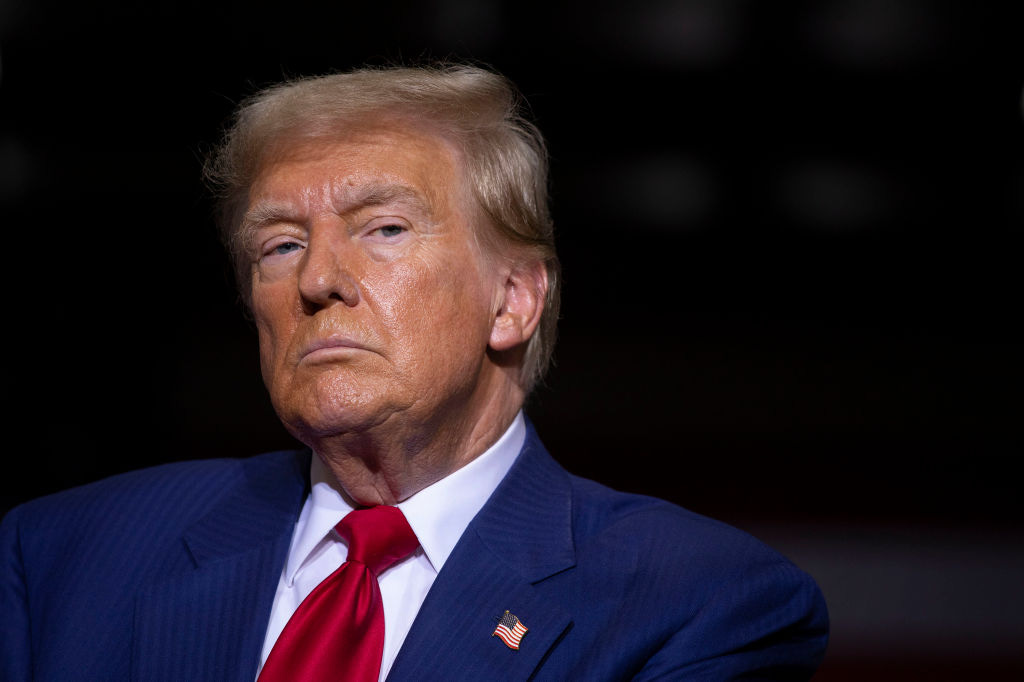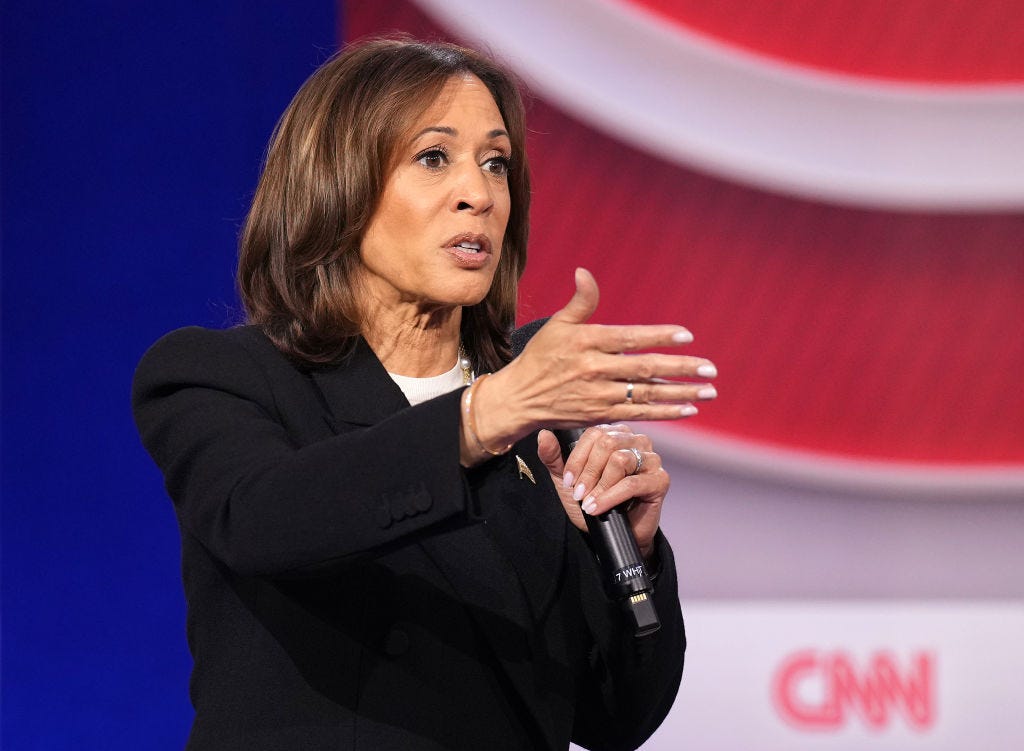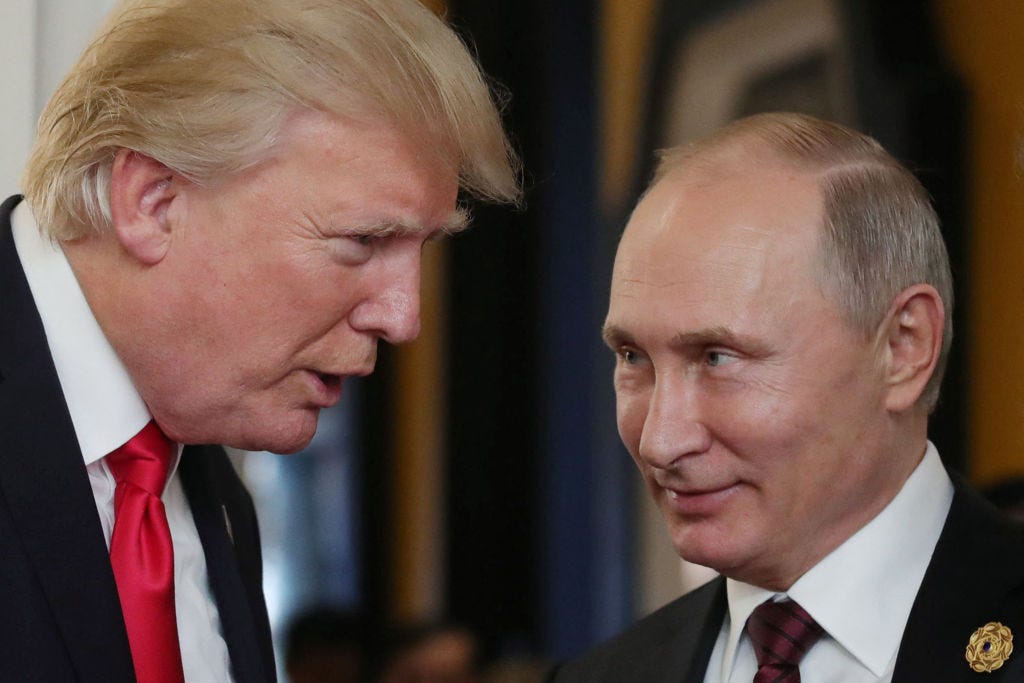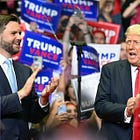'Existential Choice': I’ve Covered Presidential Elections for Decades. The Stakes of This One Couldn’t Be Higher
Donald Trump may be an unserious man but he is a serious threat to the democratic future of the United States.

American voters next week face a decision so momentous that it almost seems unreal. I can hardly believe it myself.
Pre-election polls show that only millimeters separate the standing of Vice President Kamala Harris and former President Donald Trump, the Democratic and Republican candidates for the White House. But the difference in potential outcomes, for the future of the United States and the world, spans the continent – so vast it could determine whether our 250-year experiment in democratic self-government continues at all.
It’s a night-and-day contrast from anything I’ve seen in a half-century of watching and covering presidential politics. Nothing before even comes close.
As an adolescent, I watched my father, a Washington Post reporter, cover the turbulent 1968 race between Richard Nixon and Hubert Humphrey, having earlier borne witness to the assassination of Sen. Robert F. Kennedy. As a Wall Street Journal reporter, I covered the 2000 battle between George W. Bush and Al Gore eventually decided by 537 votes in a single state. Contentious as they were, neither of those choices, pitting candidates with deep and even familial roots in the American system of government, posed an existential choice for the United States.
This one does.
That’s not because of the Democratic candidate. With popular vote victories in seven of the last eight presidential elections, Democrats have become America’s normal governing party.
Harris is a normal Democrat who favors what normal 21st-century Democrats favor. That includes modestly higher taxes on high-income Americans to finance more social benefits for those in need, protection of healthcare and retirement programs, economic policies to encourage full employment and higher wages, and a foreign policy that relies on alliances with other free nations to defend our national security from autocratic adversaries.

She has not articulated major differences from President Joe Biden because there aren’t major differences. He’s a normal Democrat, too, who has governed seriously, competently, and effectively.
The existential choice arises from the Republican Party’s decades-long descent from a dominant national majority, winning repeated presidential landslides, to an embittered, aggrieved minority that won’t adapt to the modern world. Its growing extremism allowed its capture by a dark, deeply un-American leader whose own former top aide calls him a fascist.
The Cost of a Second Trump Term
The first Republican president I covered, Ronald Reagan, drew sharp ideological distinctions from Democratic adversaries. In a stagnant, high-inflation economy, he called big government the problem and favored large cuts in taxes and social spending. During a Cold War standoff with the Soviet Union, he favored a major expansion of the military budget. But Reagan also compromised, and preserved the existing contours of America’s basic post-World War II domestic and foreign policy arrangements.
In his policies and his person, Trump promises radical changes. His dishonesty, ignorance, criminality, open racism, and affection for violence soil every category of virtue that American presidents have aspired to embody. He lacks character.
He wields post-pandemic inflation, a global phenomenon that has rocked incumbent governments everywhere, as a political bludgeon. But his proposal for sweeping across-the-board tariffs on imported goods would make it worse, raising consumer prices and making Americans poorer.
So would his vow to round up and deport millions of immigrants who have grown deep roots in our labor force and communities. His plan for gigantic tax cuts would send the budget deficit skyrocketing and imperil the solvency of Social Security, Medicare, and Medicaid.
The Supreme Court he earlier packed with right-wing justices has already wiped out the constitutional right to abortion. His most zealous advisers claim he can unilaterally move toward ending abortion altogether by invoking an archaic 19th-century law still on the books.
His scheme to expand his personal power over the executive branch and use it to pursue opponents in government, the judiciary, and the press would undermine the rule of law on which the economy, public order, and our basic freedoms depend. He aims to erode popular sovereignty – the core concept of our Founding Fathers – by suppressing the votes and voices of domestic opponents.
At the same time, Trump wants to sever America’s commitment to the defense of freedom in Europe and accommodate the Russian autocrat who helped him win the presidency; Vladimir Putin sees Trump, accurately, as a weapon to weaken America. A narcissist without principles, Trump is easily manipulated by flattery and bribery from our enemies.

The vestiges of an earlier Republican Party, outside of Trump’s frenzied MAGA base, know this but have surrendered to his leadership anyway. They comfort themselves with the belief that Trump is a blowhard with a short attention span who won’t follow through on his rhetoric.
To some degree, that pattern played out in Trump’s earlier term. On some initiatives, courts blocked him. On others, serious-minded aides like retired Marine Gen. John Kelly, the former Trump White House chief of staff who calls him a fascist, stood in the way.
Resistance on various fronts might thwart him again in a second Trump term. But the chances that he will fail have fallen.
Trump has signaled that if he returns to the Oval Office, he will surround himself with fanatical sycophants determined to fulfill his impulses. The Supreme Court has already granted him presumptive criminal immunity for whatever he does as president.
Moreover, another Trump presidency can expect wide leeway to act from Congress.
Congress at Stake
If Harris wins, she will likely be hemmed in by a divided Congress. Democrats may regain control of the House from its narrow, feckless majority Republican majority. But with critical Senate races playing out in states Trump will win easily, Republicans stand poised to recapture the chamber from Democrats who now hold a bare 51-49 majority.
That means a President Harris would struggle to win confirmation of judges and Cabinet members, much less pass ambitious legislative objectives. If polls prove badly mistaken and she wins the “trifecta” – House, Senate, and White House – she would follow the path lit by every Democratic presidency I’ve chronicled, from Bill Clinton to Barack Obama to Joe Biden.
But the broader political story of my career has been the long, gradual, top-to-bottom realignment weaving together partisanship and ideology. That makes election-day outcomes for the presidency and Congress, with few exceptions, match in states and individual House districts. A Trump victory would almost certainly produce Republican majorities in both chambers.
Holding the trifecta has allowed the last five presidents – Clinton, George W. Bush, Obama, Trump, and Biden – to pass major economic initiatives during the first two years of their terms. Today’s Republican Party has grown increasingly pliant to his wishes, however extreme.
Trump may be able to carry out his most radical plans, such as the import tariffs, mass deportations, and transformation of the independent Justice Department, military, and civil service into partisan instruments, through executive authority alone. Guardrails on his behavior would be frighteningly low.
An ‘Unserious’ Man Who’s a Serious Threat
Since he rode down that escalator in June 2015, Trump has shown himself to be “an unserious man,” as Harris put it in her speech accepting the Democratic nomination this summer. Unserious, that is, about telling the truth, knowing how government works, understanding the concept of public service, or caring about anything other than his own aggrandizement.
When I sat down with him for an extended interview at Trump Tower that September, I gently chided him for promises as phony as the characters in superhero cartoons. Like other reporters and his GOP rivals, I considered it only a matter of time until Republican voters moved on to candidates of substance.
When I moderated a Republican primary debate the following month, Trump remained the frontrunner. I tried a sharper tone before the studio audience and the millions watching on live TV.
It so enraged his supporters that the party apparatus and his opponents felt compelled to defend him. He steamrolled them for the nomination and the presidency.
I had underestimated the unseriousness of an entire party that had grown disconnected from reality and reason. Its base of blue-collar white men has become increasingly alienated as economic and cultural change threatens their status in society, and demographic change pushes America ever closer to becoming a majority-minority nation.
They identify viscerally with the anger, xenophobia, racism, and misogyny that Trump so crudely expresses. The far smaller, wealthier, better-educated group of Trump donors, who identify with his greed, rely on the angry base to deliver the votes that facilitate their further enrichment.
That visceral identification underpins Trump’s standing within the GOP. It underpins his prescriptions for the country and the unhinged operatives he now surrounds himself with. It underpins the specter of violence hanging over the outcome this fall, nearly four years after the violence of Jan. 6.
It is, in other words, what makes this unserious man a serious threat to the future of the United States.
I learned from my father, a WWII Marine who fought on Iwo Jima before becoming a journalist, that the US is the greatest country on Earth. We have the pre-eminent economy, the strongest military, and the moral example of establishing and defending the rights of free people to govern themselves.
Where we have fallen short of our ideals, we try to do better.
Harris seeks to follow that tradition, however imperfectly, however anyone assesses the wisdom or folly of her policies. Trump does not. He threatens to destroy the qualities that have made our country a moral example and defined its character.
I’ve always considered them indestructible – not just for my lifetime, but for my children, grandchildren, and generations to follow. They bent but didn’t break during Trump’s presidency.
But Trump could yet break them. That’s why I’ve titled this column ‘The Stakes.’ They are very, very high.
Catch up on previous editions of ‘The Stakes’:







This analysis of Democrats foreign policy is seriously disturbing. The author sees nothing wrong with the US led genocide taking place in Gaza and believes this is normal. He maintains Democrats ally with other like minded democratically governing nations. Not a word about how the Democrats are funding Middle Eastern oligarchs to normalise relations with the genocidal, apartheid Israel. Costing US tax payers billions every year. This article makes me seriously consider unsubscribing from Zeteo. Disgusting drivel in the midst of a US funded genocide.
Really Mehdi? Harwood is gaslighting and waxing US imperialist dribble. If I want to read this kind of jingoistic claptrap I can go to CNN for free. Is Harwood your attempt at “both sides-ism?” Again CNN is free. I want critical thinking from your authors not propaganda. Do better.